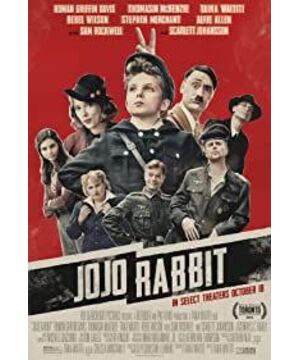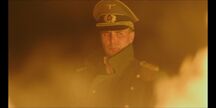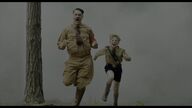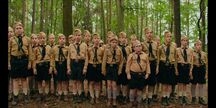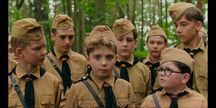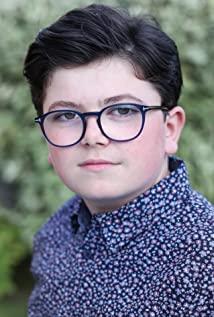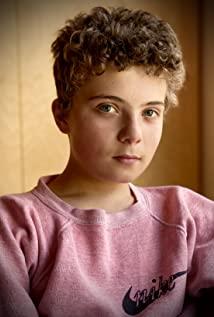Full of innocence and beauty, the imaginative Nazi boys. The sudden Jewish girl. The simple and lovely "Hitler" in the whimsical world, and his kind mother, constitute a tragic comedy full of absurd colors. The film "Jojo Rabbit", which won 6 nominations at the 92nd Oscar, tells a cold and warm story about human nature and World War II in a very relaxed and cheerful way. In the film, there are no grand heroic epics and epic battle scenes of traditional World War II movies. Some are the innocence of a child, some are the bravery and love of a mother, and some are a little bit relaxed and cheerful in the war era. Some are the beauty of human nature and a little bit of warmth.
In the film, the director uses rich audiovisual elements to present this absurd comedy fairy tale to the audience. At the beginning of the film, a series of close-ups of the uniforms of the Nazi Young Pioneers bluntly tells the audience the identity of the protagonist Jojo. At the same time, it also formed an intertextuality with the section where Jojo would salute his good friend "Hitler" in his whimsical world. When Qiao Qiao was forced to kill a rabbit by the Young Pioneers instructor to show his bravery, the director used a hasty drumbeat, as if to foretell Qiao Qiao's inner tension at this moment. Also laid the tense atmosphere of this scene. When his mother was hanged by the Nazis and Jojo talked to the Jewish girl in front of the window, the director cleverly used the contrast between the front and back scenes and placed the camera on the back of the two. In the picture, the girl and Qiaoqiao are placed in the foreground, and Xiongxiong’s gunfire is faintly visible in the depth of the field. The contrast between the foreground and the background here makes the two people's life and death dependent in the war have such a touch of warmth. It also implies that the victory of the war is coming. When the Allied forces invaded the city, Qiao Qiao came to the battlefield. The director used Qiao Qiao's point of view to show the corpse across the dilapidated battlefield. At the same time, the director used low-pitched children's solo solo to make the sound and picture counterpoint. This is quite similar to the use of the chorus of girls in red and children's voices in Steven Spielberg's famous World War II film "Schindler's List".
In the film, the director interleaves the two space-times of the fantasy world and the real world in parallel. In Jojo's whimsical world, "Hitler" is a simple, lovely, and graceful person who can help him solve problems in life. This space is a symbol of Qiaoqiao's beautiful innocence. In a 10-year-old child's world, there is always a childlike innocence. But the real world is full of cruelty and indifference. Joe Joe's father lost the news. My sister died early. His mother was also executed by Nazi fascists for secretly working for the resistance. Lonely Jojo can only depend on the Jewish girl who has taken refuge at home. This is just like the years of World War II, full of coldness. "Hitler", a character that only exists in Jojo's fantasy world, is exactly the alienation of Jojo's inner world. When the war was not over, Jojo was a child who was deeply brainwashed by the Nazi Party. He was eager to join Hitler's guards. Fear of Jews. When his mother told him that the Allied forces were coming, he had a fierce quarrel with his mother, asking her mother, "Are you going to betray your motherland?" After the Allied forces invaded the city, Nazi fascism was defeated. Jojo began to accept Jewish girls in his heart, and he also realized the cruelty of the war. The "Hitler" in his heart turned from a simple and lovely person to an angry demon, and was finally driven away with a punch by Jojo. In addition, the director set up three emotional lines in the film: the friendship line between Jojo and his friend York and "Hitler", the love line between Jojo and the Jewish girl, and the family love line between Jojo and his mother. These three emotional lines make the film full of warmth and joy. However, the director's handling of the three emotional lines is relatively simple and not deep enough. This is a shortcoming of the film.
The strong color of absurd comedy gives such a cruel story a very happy atmosphere. A more neutral narrative perspective also makes the film's discussion of World War II more objective. And Qiao Qiao's childlike innocence is quite contagious to the audience. In general, "Jojo Rabbit" is a relatively unique and excellent work on the theme of World War II in recent years.
View more about Jojo Rabbit reviews


